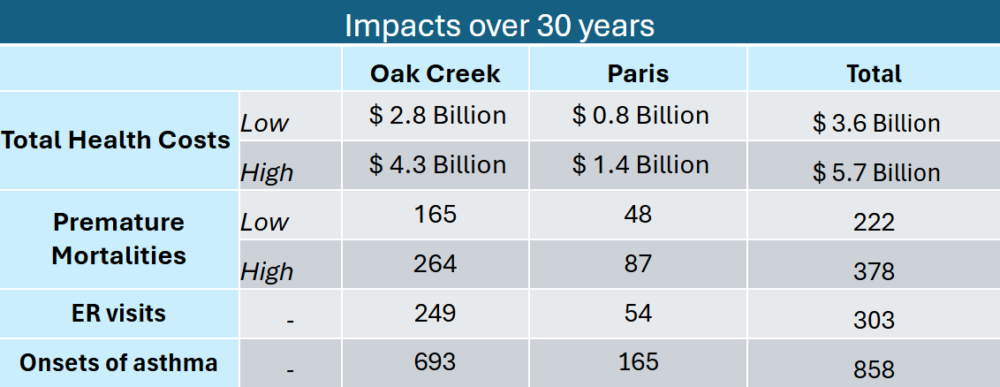A new analysis shows the construction of two new fossil gas power plants would have substantial negative health consequences for Wisconsin and surrounding communities. The study, conducted by PSE Healthy Energy for the Union of Concerned Scientists and Healthy Climate Wisconsin (HCW), found that the Oak Creek and Paris gas plants could result in up to $5.7 billion of health and economic costs over 30 years.
The Public Service Commission of Wisconsin (PSCW) is currently reviewing proposals by Wisconsin Electric Power Company, or We Energies, as the utility is commonly known, for the construction of two new fossil gas plants. One project, totaling 128 megawatts (MW) would be located in Paris, WI. The other, sized at 1,100 MW, would be located in Oak Creek, WI, on the site of a retiring coal-fired power plant.
While We Energies claims that the new gas plants are necessary for replacing coal plants and meeting the needs of energy-intensive users, such as a new Microsoft data center, many in Wisconsin disagree. The Power Wisconsin Forward coalition, led by community groups and public health and environmental organizations throughout the state, has launched a campaign to advocate for a clean economy and keep communities informed about the dangerous implications of being over-reliant on fossil gas infrastructure. Many of these coalition partners have come together to ask the PSCW to reject the proposals for new gas plants, arguing that cleaner, affordable options are available now—and they are submitting data to prove it.
Costly and Inequitable
In addition to emitting greenhouse gases, gas power plants also pollute the air with nitrogen oxides, sulfur dioxide, particulate matter, and volatile organic compounds. These pollutants are harmful to our health and can aggravate conditions like heart disease and asthma, while also increasing the risk of premature death. These negative health outcomes take a toll on our quality of life and create burdensome costs for those who are affected.
In partnership with HCW, a group of health professionals advocating for climate action, UCS has co-intervened in the Oak Creek gas plant case to draw attention to the public health risks posed by fossil gas for nearby communities. PSE Healthy Energy, on behalf of UCS and HCW, drafted a report and provided expert testimony outlining the many consequences of fossil gas pollution on public health and related economic damage.
The experts at PSE applied widely used models such as EJScreen and the CO-Benefits Risk Assessment (COBRA) tool from the Environmental Protection Agency (EPA) to assess the impacts of We Energies’ proposed gas plants on surrounding communities. EJScreen allows users to view the ways in which different communities may be disproportionately affected by environmental hazards compared to the rest of the country and state, while COBRA assesses how impacts in public health—and their associated costs—can be affected with shifts in pollution levels such as those observed with new gas plants.
PSE found that the proposed Oak Creek gas plant would be associated with health and economic impacts totaling as much as $144.8 million annually (based on a 20% capacity factor), while the Paris facility health and economic impacts would result in a total cost of up to $47.4 million annually (based on a 60% capacity factor), with premature mortalities also factoring into that total. These figures only summarize the costs observed over a single year. The utility has stated in its applications that the proposed gas plants should run for at least 30 years—bringing that cost to as much as $5.7 billion for both plants—increasing costs and loss of life.

The total costs outlined above capture health-related economic impacts that include (but are not limited to) premature mortalities, heart attacks, visits to the emergency room, and missed work and school days. For a more detailed description of impacts, check out the COBRA manual.
PSE also found that the addition of the proposed gas plants would place additional burdens on communities already disproportionately harmed by environmental pollution. Both locations near the Paris and Oak Creek sites experience ozone and small particulate matter (PM2.5) concentrations above the state’s average, signaling that these local communities are already facing heavy environmental health risks. Notably, the Toxic Releases to Air indicator—which measures an area’s high concentration of toxic air pollutants—measured at Oak Creek was 60% higher than the state average and around three times the national average. The populations living near the Paris facility are 28% low-income and almost 20% are older adults. These communities may be extra vulnerable to the damaging impacts of gas plant pollution, both in health outcomes and costs.

Spatial distribution tools like the one used here (InMAP) allow us to visualize how pollution from gas plants in eastern Wisconsin affect not just local populations, but also neighboring states downwind like Michigan.
These results are laid out in detail in PSE’s report, and they highlight the myriad ways in which continued reliance on fossil fuels by utilities would be a step back for Wisconsin communities.
Forward Together
The construction of these two gas plants would cost around $2 billion—a cost that gets passed down to We Energies customers’ through their electric bills, which is especially risky considering these plants may become stranded assets as efforts to clean up our power grid continue in the future. Add to that the health and economic impact costs outlined above, plus the growing cost of damages due to climate change, and you’re left with fossil fuel assets that come at the expense of our health, our future, and our pocketbooks.
We Energies is the most profitable utility in Wisconsin, and it has a responsibility to provide safe, reliable, and affordable energy to its customers. There is no shortage of evidence showing that clean, renewable energy can meet those needs, and We Energies should be held accountable for the public health and economic harms of its proposed gas investments.
Now is the time for Wisconsin and the PSCW to tell We Energies that profits cannot be placed over communities. The way forward is clean, affordable, and reliable renewable energy.
The PSCW is currently taking public comments for the Paris gas plant case now through February 17th and is holding public hearings on February 5th. The comment period for the Oak Creek gas plant case will likely run from late January through March with public hearings on March 25th. Follow this link for updates to the PSCW’s schedule and to submit your comments in support of clean and healthy energy!

